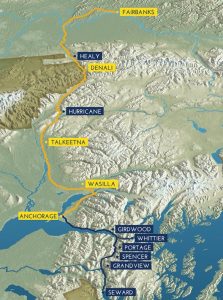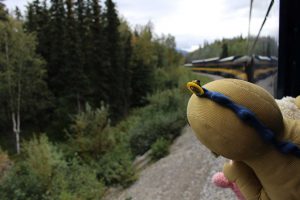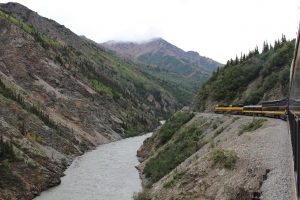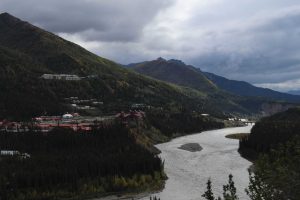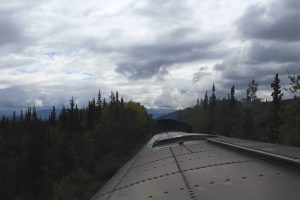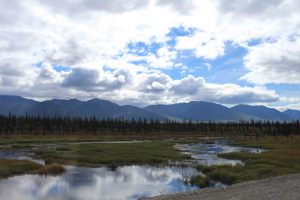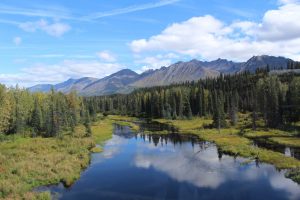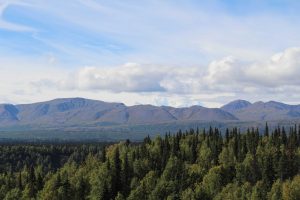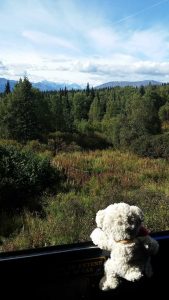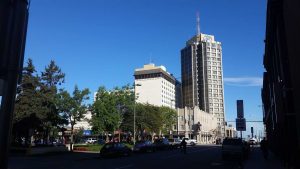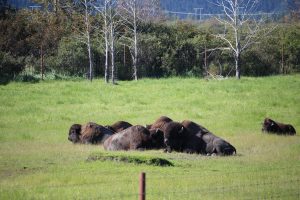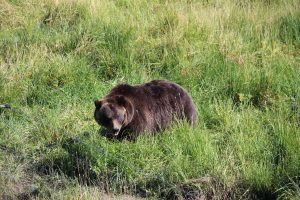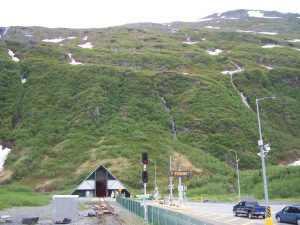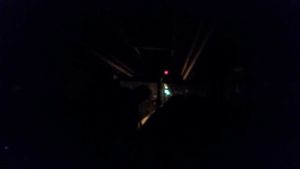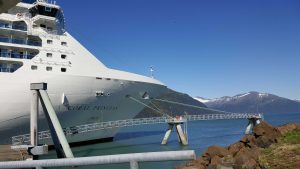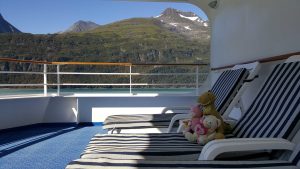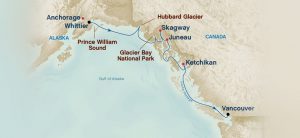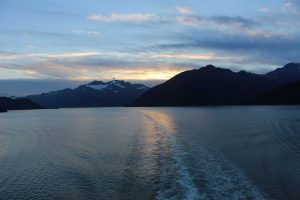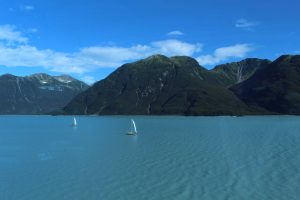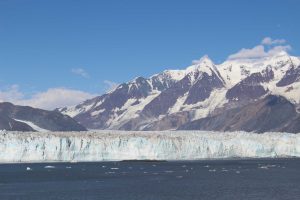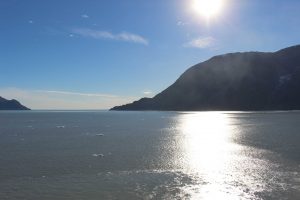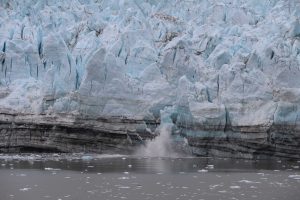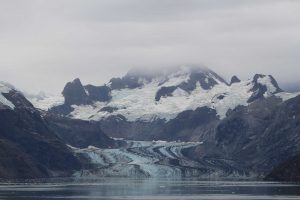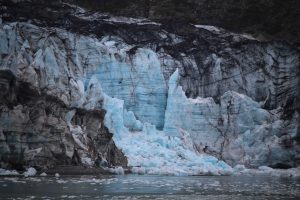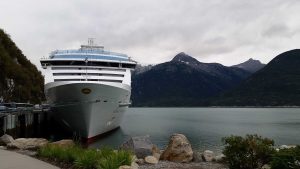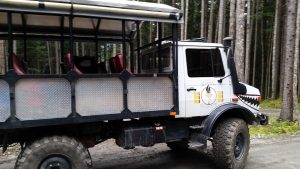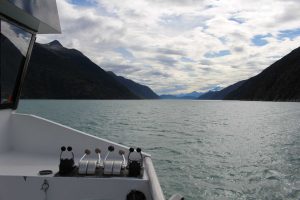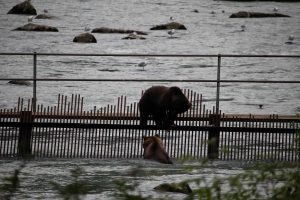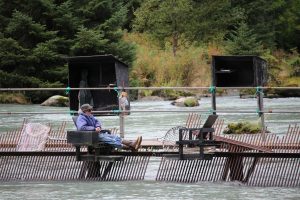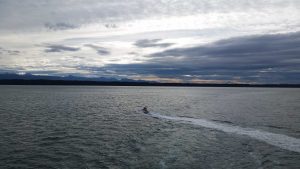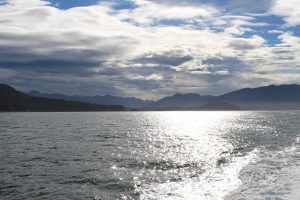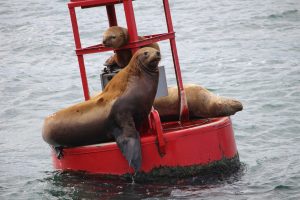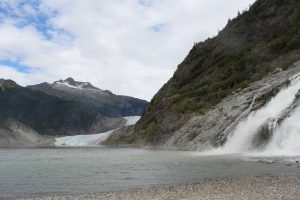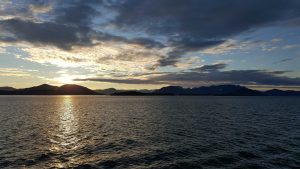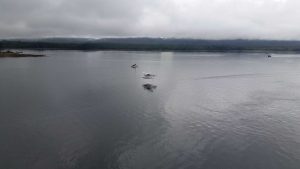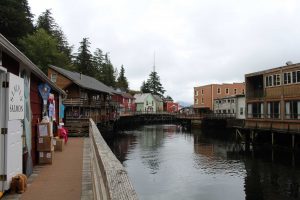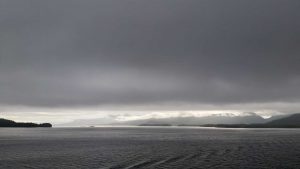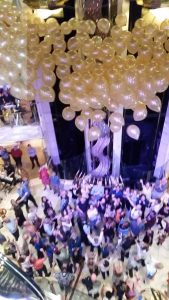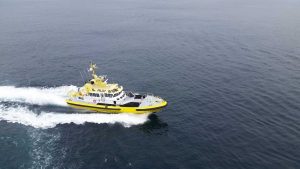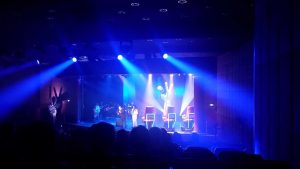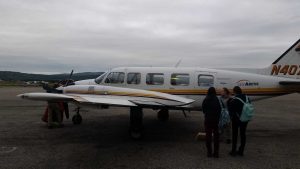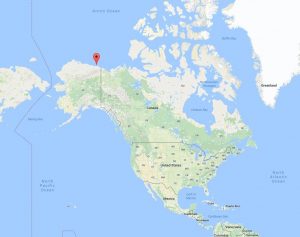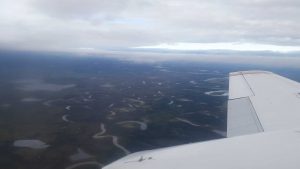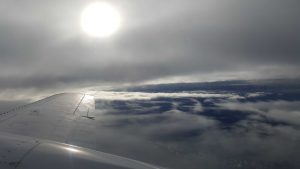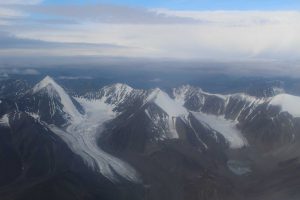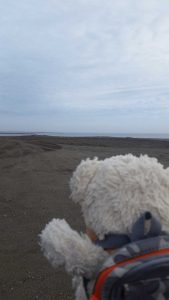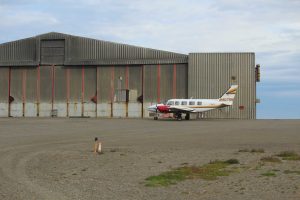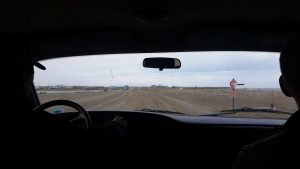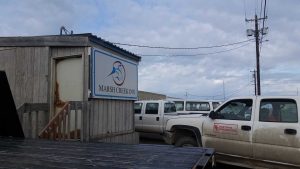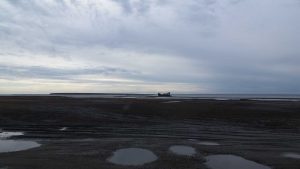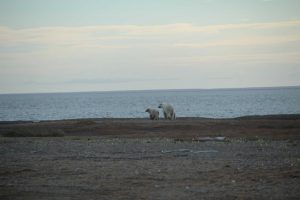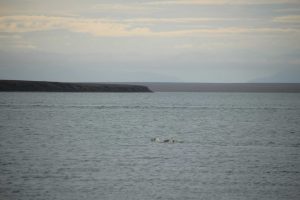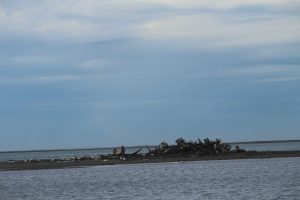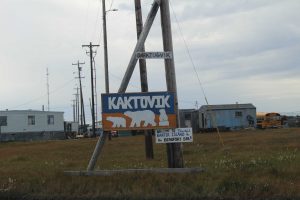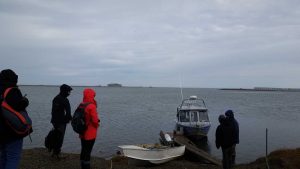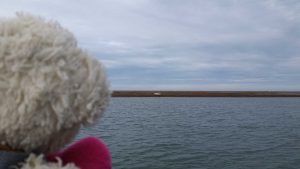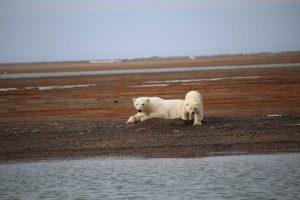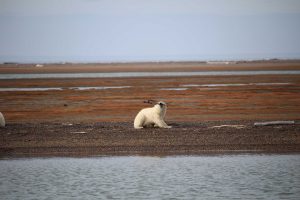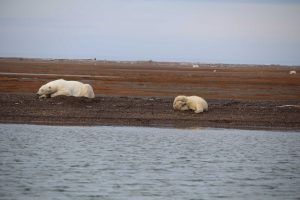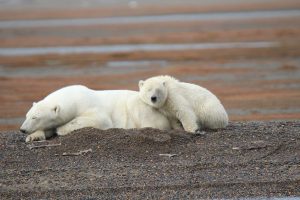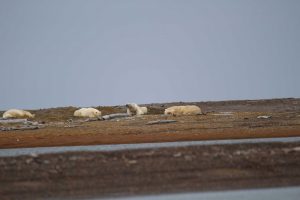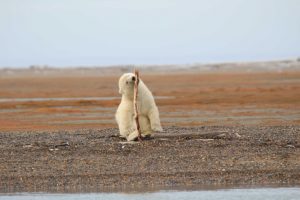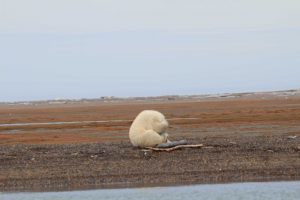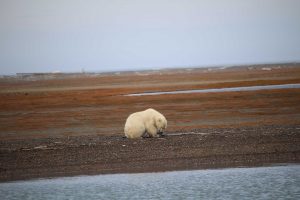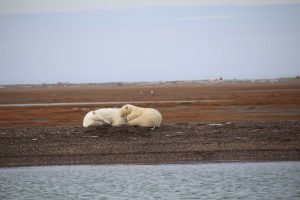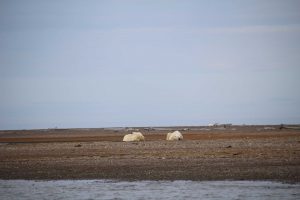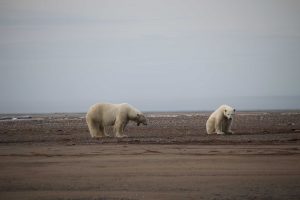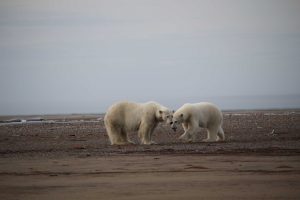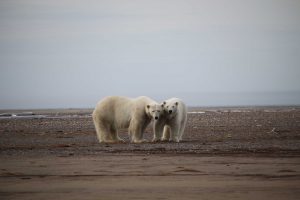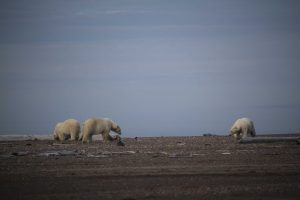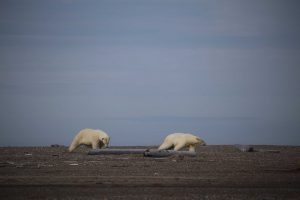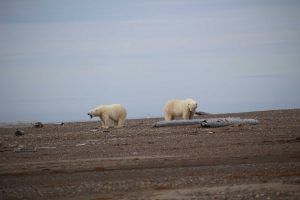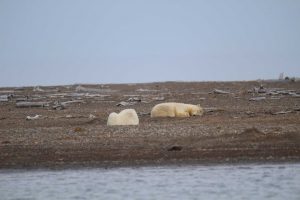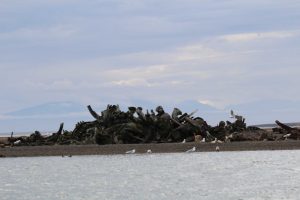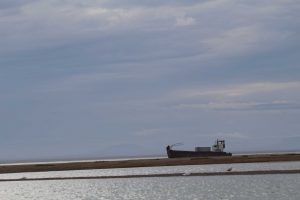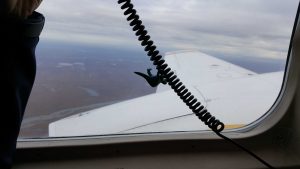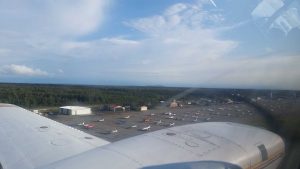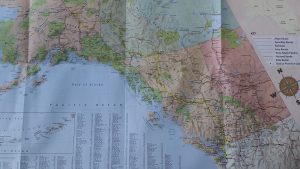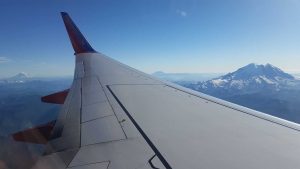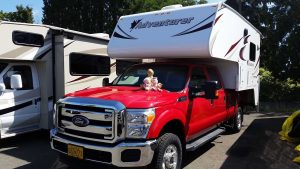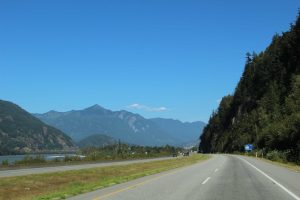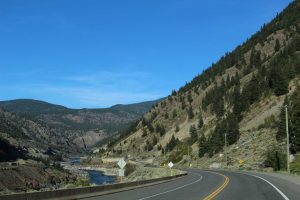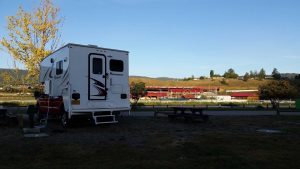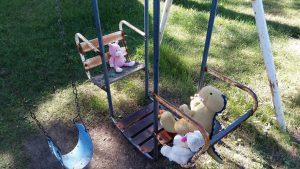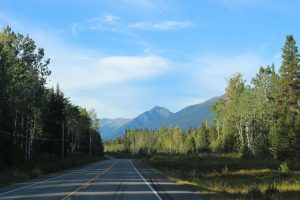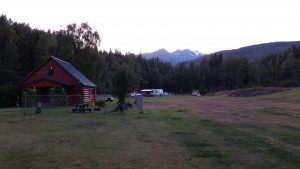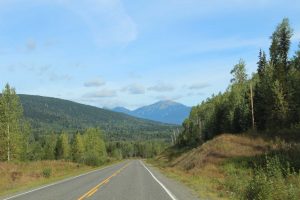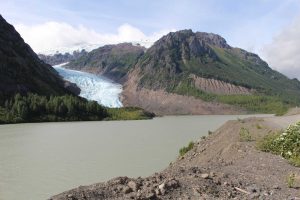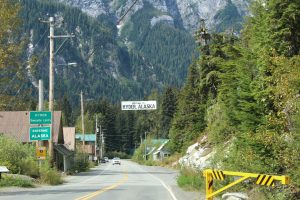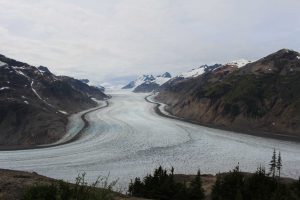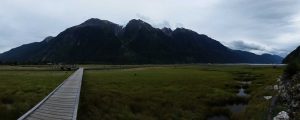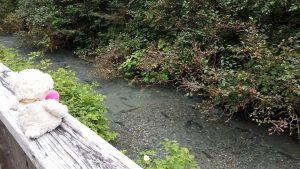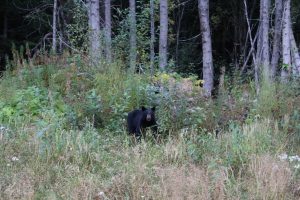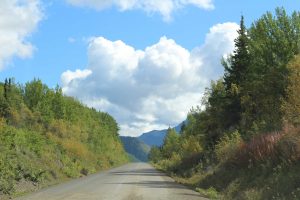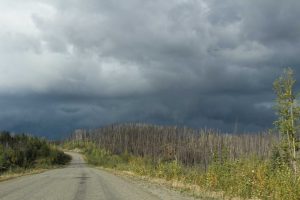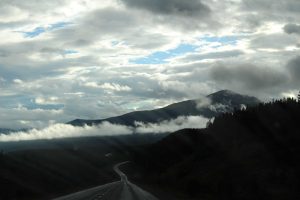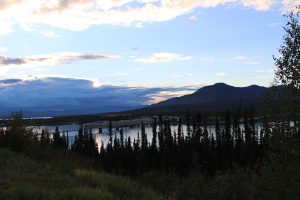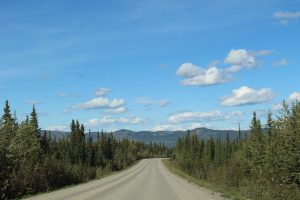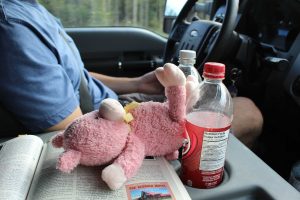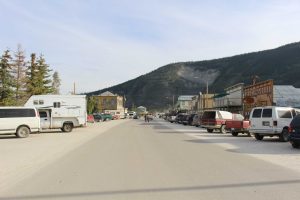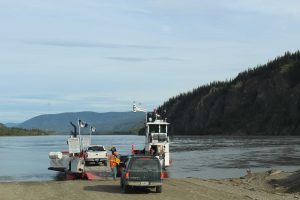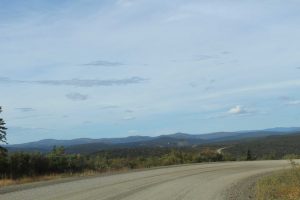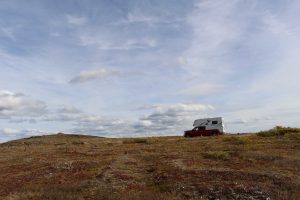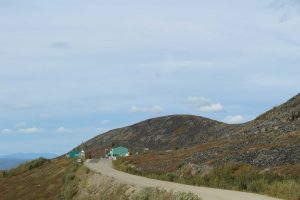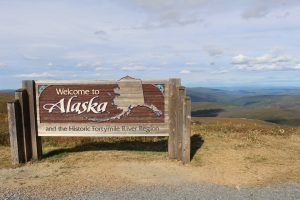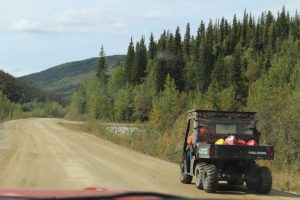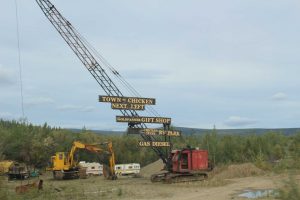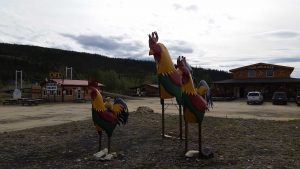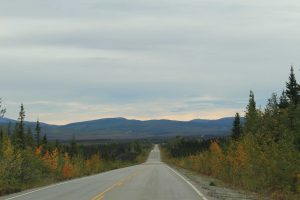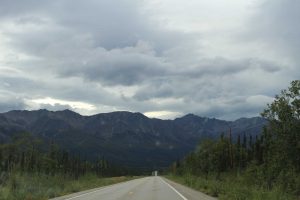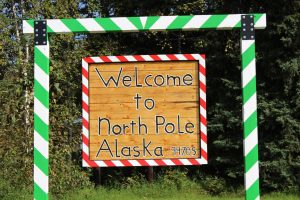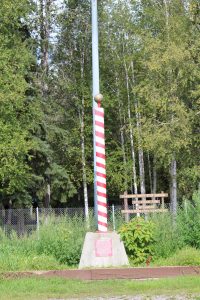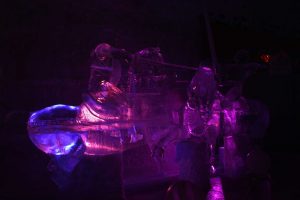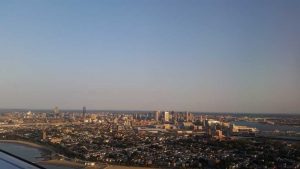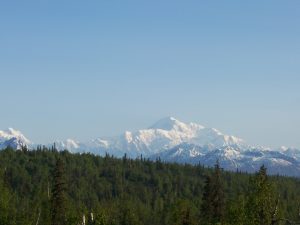Dinosaur Bear Presents:
North to Alaska Part 3 of 4:
Below that old white mountain
[Continued from Part 2]
Greetings,
If you’ll recall from last time SB and I had just returned from the Polar Bear Kingdom of Barter Island up in the Arctic Circle and were getting ready for bed. While early mornings tend to creep their ways into vacations requiring a lot of movement, the next day was another especially early one (but not as early as polar bear day) since we had to catch the morning departure (8:15) of the Denali Star from the Fairbanks Train Depot. We were southbound for Anchorage – about a 12 hour train ride in total – and if you look at the yellow route in the photo below it gives you an idea of our path.
So, after a decent(ish) night’s sleep we got a cab down to the depot where we arrived early like the Alaska Railroad said we should. Of course just like we anticipated there was no real reason to be there as early as they wanted you to be; at least not in Fairbanks on a late August morning. We also checked our travel backpacks because their instructions said they were too large. That was kind of a joke as we could have easily taken everything on the train, but meh, at least it was free. Speaking of free, once boarded we found out that we had plenty of free space – not only for our bags, but for us. Turns out we had the entire car to ourselves to start the morning off. In fact we didn’t even end up getting anyone else in our car until we stopped at Denali around 12:30pm where we gained a whopping two people. The boys highly approved of our “private” train car.
Oh, if you’re wondering why Tristen has a pin clipped to his spikes, well, that’s a bit of a story that Tristen is quite proud of. The nutshell version of it is that our Conductor, Conductor Warren, took a liking to the boys because Conductor Warren travels with a Coca Cola polar bear named Mr. C. (and even seat-belts him into the passenger seat of their RV). As such, Conductor Warren noticed that Tristen was quite the dangerous and ferocious dinosaur and gave him an Alaska Railroad pin to be licensed to be on the train “because he’s dangerous.” Tristen was ecstatic and we had to listen to Tristen’s authoritah’ for the rest of the trip, and still hear about it almost every day.
In addition to the fun going on in “Train Car Taco” the scenery outside was beautiful.
While traveling we accomplished feats such as crossing over the Tanana River in Nana (you can’t make this stuff up). We also saw our third moose and passed through the town of Sherman, AK (that link currently has a story [from 9-12-2016] about Conductor Warren too!) which is the smallest town in all of Alaska with a total population of 2. Yep. Conductor Warren told us that the family who lives there were homesteaders who raised a bunch of kids (all of whom moved on, imagine that) but still live there. There is even a book store (read: book lean-to) out by the railroad tracks where you can buy the three fiction books that the wife has written about their time as “modern-day” homesteaders. Way cool. A bit further south than that we passed three dudes who were literally living in an old shipping crate in the forest. Honestly I can think of far worse ways to live one’s life.
By and large the route was wilderness (with the occasional shipping crate camps and places like Sherman) though there were a few spots of civilization, such as the aforementioned “town” area of Denali which houses a bunch of lodges.
Those red-roof buildings are actually one of the places my grandfather and I stayed 10 years ago. Speaking of that last trip, last time around it rained a fair chunk of the time we were on our first train (the second, to Whittier, wasn’t raining though), however this time around since we were on the train for 12 hours we saw a good spread of weather, from light rain at the beginning of the day:
To partly cloudy skies in the middle of the day:
To mostly blue skies by the end of the day:
Of course we also saw that old white mountain just a little south-east of Nome.
Sure, it’s mostly hidden in that photo and it’s also about 55 miles away. The thing was, we honestly weren’t even expecting to see Denali at all from the train. Not only is the train, as mentioned, a good bit away there’s only around a 33% chance you’ll see Denali due to clouds, etc. on any given day. Plus, I’d already seen it unobstructed 10 years ago – though back then it was still called Mt. McKinley (I prefer Denali) – so even just seeing a portion of the tallest mountain in North America was a treat. At 20,310ft it’s quite difficult to get all of it in a picture, but that said, we did see all of it, just not all at once. Through the course of an hour or two we saw the base, middle, and top as both we and the clouds moved. We were nowhere near as close as I’d been last time (which still wasn’t that close) but it was still really cool to get to see the peak burst through those clouds nearly 4 miles in the air. Valentino loved it.
After lots of train fun (and nearly depleting our food supply as we only brought snacks as train food is prohibitively expensive back in the “poor people” cars where food isn’t included – but the train café person seemed to like us SB and kept giving us free coffees and soft drinks) we finally made it to Anchorage. Last time I was in Anchorage it was cloudy and raining (so much so that I couldn’t even see the surrounding mountains) and when our AirBnB host picked us up from the train station she said it had just stopped raining the day before after about a 10 day run of rain. Good timing. She was originally from the Seattle area and had worked as a teacher outside San Francisco for 10 years before moving to Alaska “for a new adventure.” She was a crazy (but nice) cat lady, but barring that, both SB and I agreed that she was shockingly similar to Meem – so much so that we wondered if she and Meem were cosmically connected (sans love of cats of course). Tristen and her cat apparently fought all night long, but no one but the two of them seem to have been aware of this. That night we replenished our snacks and got to bed early.
The next day we went out and explored Anchorage on foot for a little bit, including breakfast at “Biscuit Bettie’s,” which was quite similar to a place we’d eaten at in Seattle called “Biscuit Bitch” (Tristen’s all-time favorite eatery). I think the contrast of biscuits and feminism is kind of funny – and obviously intended. We also checked out the Anchorage Farmer’s Market – where you could still see Denali way off in the distance (and to put that in perspective, the mountain was 135 miles away at that point) – before settling in at the downtown Hilton to wait on our shuttle to Whittier.
That was actually the hotel I’d stayed in when I first arrived in Alaska 10 years ago, which was kind of cool. This time around I was just a lobby-pleb and couldn’t even use the restrooms. We had booked a shuttle combined with a wildlife tour to get us to Whittier, which despite sounding expensive was cheaper than the actual cruise transfer buses. Well, our shuttle was late and they only did one of the three wildlife stops they were supposed to and the one we did stop at was rushed to the point of being virtually unenjoyable. That said, I say “virtually” because we still got to see beluga whales from the bus, then a smattering of creatures such as wood bison, grizzly bears, wolves, a baby black bear, big ole’ grizzly bears, elk, deer, and old people at the Alaska Wildlife Conservation Center.
As usual we were big fans of the bears.
Along the way we also got also got to learn about and see some damage from the Good Friday Earthquake (which is still the most powerful earthquake ever recorded in North American history).
From there it was just a short jaunt to the Anton Anderson Memorial Tunnel, a 13,300’ long tunnel that bores under Maynard Mountain. The tunnel switches between car and train use and has a strict daily schedule (which supposedly had created a 3 hour delay that morning thus obliterating our wildlife schedule – supposedly). Since we were towards the back of the bus I didn’t get a good photo, but here is a shot I took from the train 10 years ago (which is technically on the Whittier side, but you get the picture).
And then for fun here is a photo taken from inside the tunnel. If you look very closely you’ll spot Pig. Pig loves tunnels.
Once through the tunnel you quickly find yourself in the port town of Whittier, population 214. Now, Whittier got its modern-day start as a military base during World War II. The military chose Whittier because it had such horrible weather (it rains or snows like 400 days a year) and was so difficult to get to via land (mountains) or water (have to go all the way up an icy channel). This was a good place to put a base you didn’t want the Japanese to know about (and really the Russians too, let’s be real). The Japanese never found it, and long story made short, it’s now a town for Princess boats to leave from and also for essentially the entire population to live in one building (no seriously). Interestingly enough we had clear blue skies when I was there this time (but not last time).
This was the first time we saw our boat ship the Coral Princess.
Oh, I didn’t mention? Yep, we were doing a cruise too. 😀
See, the way I figured it we had done airplanes (large and small), cars, boats, and even a train, so why not add a ship in the mix. Plus Princess was who I’d sailed with 10 years ago (on the Diamond Princess that time – but the same route this time) so I figured that was another good excuse. They even had my old account stuck in a dusty file cabinet somewhere so I got a Gold cruise card while SB only got a Blue one. 😛
I was the only one who had been on a cruise ship before, but the boys took to it quite quickly.
Here is the southbound route we were taking, if you were curious.
As you can see, it was totally centered on the Inside Passage.
Boarding the ship was pleasantly easy as we arrived after the morning swarm and before the evening swarm – and when we boarded the ship the average passenger age dropped by about 50 years. After dropping some stuff off at our cabin (where SB found the banner, balloons, and chocolate covered strawberries I’d gotten for her graduation) it didn’t take long for us to become cruise tourists. In fact within before it was even dinner time we’d already had a beer (Seawitch – Princess’s craft beer sourced from various breweries) and SB had even managed to win a $50 spa raffle.
That evening we departed from Whittier and were on our way.
That same night we also had, in addition to dinner itself, ice cream, pizza, more beer, and checked out the hot tubs.
The next day was our first full day at sea (which meant lounging in the room for most of the morning and getting room service) and the destination of the day was Hubbard Glacier which lies in Yakutat Bay.
Hubbard Glacier is 76 miles long, making it the longest tidewater glacier in North America (there are three kinds of glacier: alpine, valley, and tidewater – each referring to how far down the glacier reaches). Hubbard Glacier reaches heights of 328’ in some areas, and surges forward around 7’ per day and thus routinely calves off icebergs the size of a ten-story building. The ice in Hubbard Glacier takes about 400 years to reach the tidewater from its furthest source: Mount Walsh (11,000’).
We didn’t see any ten-story icebergs, but we did see calving (SO LOUD) as well as a myriad of smaller icebergs.
Due to the size and treacherous nature of Hubbard, big cruise ships can’t get very close but smaller tour vessels can (there is actually a large tour boat in the second photo above, as a size reference). However, the next day we were bound for to Glacier Bay National Park which allowed us to get much more up close and personal with some glaciers.
So, in order to prepare for such a day we did the happy hour at the Wheelhouse Bar (the first of many), had mimosas at the Captain’s Greeting – though we just took the drinks and didn’t stay for the greeting, lol (in fairness everyone was in evening attire and I was rocking some cargo shorts) – enjoyed some massages at the Lotus Spa (due in no small part to SB’s $50 windfall) – and even played a few rounds of putt-putt golf where I scored a hole-in-one in the final round (the round where SB was picking the rules and shots no less). That evening we watched a comedian at the Universe Lounge (Rollin’ Jay Moore) before getting to bed as unfortunately SB was starting to get a bit seasick.
The next day we woke up to some National Park Rangers getting on board (our cabin was at the back of the boat, so we could hear the boarding process) and also glaciers, lots and lots of glaciers! Because we were closer this time around we also got to see some calving action more closely.
That’s Margerie Glacier, and while Margerie Glacier is nowhere near as large as Hubbard, it was still really cool to get so close to it and to be able to watch it calve. Margerie is a fairly active glacier, and like Hubbard gains around 7’ feet a day, but also loses around 7’ a day. Margerie is considered a “success story” for glaciers as unlike almost all other glaciers on the planet, it hasn’t started rapidly melting since we industrialized. While in the Bay we also stopped by Johns Hopkins Glacier, which was of course named after Johns Hopkins University.
Interestingly enough – given the glacier’s namesake’s affinity for medicine – there is a really neat looking geological suture right next to glacier where two tectonic plates have collided. Another thing that is quite amazing is just how blue the glaciers are (or rather, just how blue the glaciers appear to be to our eyes).
Another amazing thing – in a bad way – was just how much Glacier Bay had changed in 10 years. I’m not going to get into the politics of climate change here (because that is what the argument is, a political one, not a scientific one), but I know what my own eyes see – and the glaciers in Glacier Bay have receded a good deal in just 10 years. This isn’t an uncommon trend, for example some of the largest glaciers in Glacier National Park in Montana are expected to start vanishing as early as 2030 – and this isn’t some “liberal” nonprofit saying this, that’s the words straight from the U.S. Geological Survey. So, whatever you believe or don’t believe, I can say for a fact that the glaciers in Glacier Bay are on the whole retreating at an unprecedented pace. That his retreat just so happens to coincide with the largest CO2 levels in at least 650,000 years or so (per those tree huggers over at NASA), well, I’ll leave that one up to you to interpret.
Anyways, back on track, after our day of cruising in Glacier Bay we did another happy hour at the Wheelhouse Bar (our favorite bar on the ship – plus we had a dedicated server who worked there who we even met off-ship the next day in Skagway), then relaxed in our cabin for a while and watched “Paddington” and the bulk of “Home.” After that we had a fancy dinner at the Bayou Café with steak (filet mignon), salmon, sweet potato pie, and deep-friend peach pie. We had an onboard dining credit due to a promotion I had gotten during booking; otherwise we’d have stuck to the free buffet, haha.
The next day we docked in Skagway, AK where we set out nice and early for some zip-lining adventures.
We drove out of Skagway itself as we were headed up into the hills to Grizzly Falls. On the way we passed some Americas (bald eagles) and some really funny road names. On the outskirts of town there really isn’t anything there, so if a landowner builds two or more structures off of the established road then they get to name the spur road. Some good examples were “Lois Lane” – which I thought was pretty clever – and then our personal favorite: “Ragged Ass Road.”
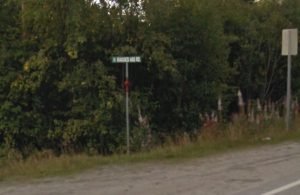
Blurry Ass Image courtesy of Google Maps
Not only was seeing “Ragged Ass Road” on one of those official green and white street signs quite funny, it was also a really good description of the road itself. Once at the base of the mountain we transitioned from a van to an Unimog. I had no idea what the hell and Unimog was, but it turns out that it stands for “UNIversal-MOtor-Gerät” or “Universal Motorized Device” in German. This is an Unimog:
After a somewhat crazy climb via the Unimog (which explained why we needed such a vehicle) we met our-zip lining guides: Cassidy and Devin. Both SB and I agreed that Cassidy and Devin were absolutely hilarious and truthfully consisted of like 50% of our enjoyment for the day. Of course the zip-lining itself was also a blast.
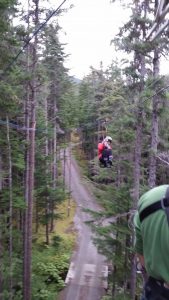
In defense of SB in the photo above: She isn’t clumped up in a ball because she is terrified (insofar as I know at least), she’s clumped up into a ball because that was a particularly long line and they were worried she wouldn’t weigh enough to make it to the end if she wasn’t in “cannonball” mode.
Our zip-lining trip down Grizzly Falls consisted of 11 lines with names such as “Alaska Pipeline,” “Big Kahuna,” “Little Kahuna,” and “The Salmon.” The “Big Kahuna” is so called because you can reach speeds of up to 45mph while going down it. You also have several opportunities to go upside down, do flips, spins, etc. on most of the lines. It was a blast. Plus at the end you get to roast marshmallows. There were some AWESOME professional photos of both SB and I taken while zip-lining (including one of me upside-down) but sadly they were extremely expensive, basically like 20$ or 25$ for one photo, so we decided to pass despite how good they were.
After zip-lining we had lunch (and beer) at the Skagway Brewing Company, where I tried their Spruce Tip Blonde Ale and SB had their Prospector Pale Ale. From there we walked around Skagway for a bit before catching a ferry over to Haines, AK.
There we saw a TON of wildlife, the most prominent of which was a family of grizzly bears (mom + two cubs) dining on some salmon at a weir on the Chilkoot River.
This was when we completed our big goal of the Bear Trifecta™ – that is seeing, in the wild, all three types of bear in Alaska: the black, the grizzly, and the polar. Woo!
I also found my dream job.
I can’t remember the guy’s name (I think it was John or Jack), but he sits in the middle of the weir and counts salmon. That’s it, that’s his job. He is also only about 20’ from the family of grizzly bears – though they seem to have accepted him into their environment. He doesn’t have to interact with people, he just sits and counts fish, drinks beer, and then goes to his little cabin (which is just on the other side of the weir). It’s a seasonal job, so it’s not year-round, but it’s a decently long season. I want that job and I am not even joking.
Up above the river was a family of Americas, complete with two little baby Americas.
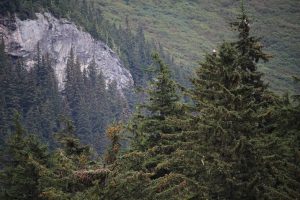
The baby Americas are in the lower left, while mommy and daddy America are at the top right.
We also spotted some mountain goats in addition to the bears and eagles. From there we headed back to Skagway and our cruise ship for the evening.
The next day we arrived in Alaska’s capital, Juneau!
We had a big day planned which started with a trip out into Auke Bay for some whale watching!
We ended up seeing a whole bunch of humpback whales, including a mother and calf which the guides said they hadn’t seen in a few weeks.
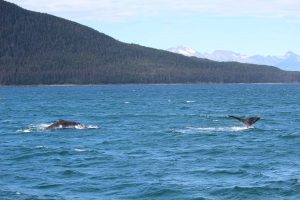
The mother is on the left, while the calf is on the right preparing for its terminal dive.
We also saw a bunch of sea lions in the water as well as on their buoy castle.
We were next supposed to have a salmon bake at the Orca Point Lodge on Colt Island but the tide was really high and the waves were really strong, which meant we couldn’t safely dock at the floating dock the island uses. So we didn’t get to do that (but did get a refund for that portion at least), but the good news was that our adventure for the day wasn’t over yet as we were next headed to Mendenhall Glacier, seen below with Nugget Falls to its right.
We got in a nice hike here before heading back to the ship (and Pigsten picked out a glacial rock). On the way back some old bitty had left her pet even-older bitty to wonder off, so our departure was delayed. Then old bitty’s husband went looking for old-old bitty, (despite the driver telling him not too) and then old-old bitty came back in the meantime (20 minutes late mind you). Then the driver was told she couldn’t wait anymore (we are already 25 minutes behind – and the ship will leave with or without us), so we left without the husband – and keep in mind, it was this one group holding up an entire bus full of people because they were too stupid to understand time. Commence old-bitty meltdown. It was quite funny. The best part was that the old bitty was convinced she was in the right and that we all had her back, but it was pretty clear that everyone on the bus thought she was just an old bitch. I even tipped our driver to spite the old bitty (as did everyone else) which further enraged the old-bitty. Gotta love when people’s selfishness comes back to bite them in the ass. Old bitty was taking photos of the driver’s name-tag and everything, so I wrote in about the driver to provide a counter-view of the event, namely calling out the old-bitty for what she was. Seeing them get pwned made the tour 10x more worth it to me.
That evening we sailed out of Juneau to a gorgeous sunset.
We also got to see some more whales, and even got to see them jumping out of the water! I mean like full-bore breaches, it was amazing. We also had commentary from our on-board naturalist named Jules. Yes, Jules, I’m not even lying. I called him Jules Verne and despite never meeting him in person had all sorts of all mental images of what I hoped he looked like.
The next day we arrived in Ketchikan, AK which had just as many seaplanes as I remembered from 10 years ago.
Ketchikan is a very interesting town and is surprisingly large with around 13,800 people living in the town and surrounding borough.
The big event of the day for SB and I was going snorkeling! Yep, you read that correctly, snorkeling in Alaska. Unfortunately SB wasn’t feeling well, but we didn’t let that stop us from enjoying the water time. Of course it was cold – yes I know you were wondering. We also had wetsuits as opposed to dry suits. Apparently dry suits are really only used for water 52 degrees or below, while our water in the Tongass Narrows was a toasty 56 degrees that day. Still, once your body heated up the water in the wetsuit it really wasn’t that bad. Plus we got to see a variety of fish (including salmon), hermit crabs, big crabs, little jellyfish, a huge jellyfish (though I think I was the only person in the group to see it), and even hold some starfish, sea cucumbers, and sea urchins. Also, since I tend to be pretty good in the water I also took a weight belt which allowed me to do some free diving out away from the group with one of the instructors – that was a lot of fun though the current out that far was pretty intense and made me glad I am a confident swimmer. Pigsten acquired himself a snorkeling rock during one of these deeper dives.
All in all, it was a super fun experience and I can now say I’ve snorkeled in both the Pacific Ocean (Alaska) and the Atlantic Ocean (Bahamas)!
After snorkeling we headed back into town where we walked around for a bit, including a jaunt along Creek Street which was where Ketchikan’s red light district used to be.
We got to see some more salmon runs and spawning and I also saw some harbor seals hunting the salmon (technically in the middle of the street! Haha). After that we headed back to the ship so SB could get a nap while I wandered around the ship as it left port.
That evening we did the later happy hour (at the Explorer’s Lounge) and also went to the ship’s balloon drop party!
After that we headed to the late “Adult Version” of Rollin’ Jay Moore’s comedy show which didn’t start until 11:15pm and was 18+. While it was raunchy I think the ship was being a little too cautious with all the warnings as it wasn’t anything over the top. Of course when your average passenger age is about 200 you never know how “adult” humor might sink in. Speaking of passenger age, during the second day of the cruise an elderly passenger died on board – yeah seriously – turns out those boats have morgues and everything, kind of interesting actually.
The next day – our last full day – we cruised along the coast of Canada and picked up some maritime pilots from a Canadian pilot boat. Again, being at the back of the boat we had good views of the boarding.
That last full day was a pretty chill one for us; we slept in and had a late breakfast then mostly just lounged and took in the views.
That evening we did take in some nightlife including watching “The Voice of the Ocean” which is basically a licensed offshoot of “The Voice” that takes place on ships.
A few of the people were outstandingly good, and although my favorite person ended up in 2nd place, SB’s choice won. After that we watched a crew talent show, which was really amazing because so many of them were wonderfully talented at song, instruments, etc. Our personal favorite was the Assistant Cruise Director who had an awesome voice, though I was also mad impressed by a drumming bartender who was better than many professional drummers I’ve heard.
After one final night of cruise-shippery we headed back to our cabin and got most of our stuffed packed up for the next morning: our arrival to Vancouver and departure from the Coral Princess. But, as you probably guessed, that’s a story for Part 4.
Until then,
-Taco
